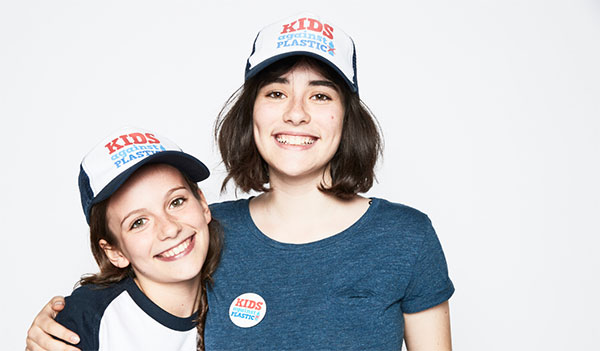“Now is the ideal time for everyone to focus on activism so that when we can go out more after coronavirus, we’ve all got more of a launchpad to campaign for positive change and take action,” says 14-year-old environmental activist Ella Meek.
Together with her sister Amy, 16, she founded Kids Against Plastic, now a registered charity, to encourage individuals, schools and businesses to be more ‘plastic clever’ and ditch single-use plastics where possible.

“This pandemic is definitely a wake-up call,” says Amy, 16. “It’s showing people how different our world can be without excessive use of cars, for example. We’re seeing more wildlife recuperate, a drop in air pollution – the silver lining is that now is an opportunity for us to start all over again and try to create a society that is greener.”
Since setting up their own student-led campaign four years ago, they have collected 72,704 pieces of rubbish and their passion for inspiring others to make positive change has led to exciting opportunities for the sister duo.
From presenting their first TEDx talk and speaking to leaders in the aviation industry about reducing their plastic footprint, to addressing politicians in the House of Commons and attending the United Nations’ Young Activist Summit last December, the Nottingham-based sisters are making waves.
“Speaking at the UN in Geneva on Human Rights Day was an incredible opportunity – it was so inspiring and motivating to speak alongside the other activists and hear their stories,” comments Amy. Down to earth but with huge dreams for the future, the sisters also relished the chance to speak to other schoolkids, the media and UN delegates that day, and spread the environmental message they care so much about.
To top it all off, they have just published their first book, Be Plastic Clever, which takes a closer look at plastic, its impact on the environment and the potential solutions, with a foreword by wildlife presenter Steve Backshall. “As a durable material, plastic is brilliant but it makes no sense to use it for manufacturing items that are thrown away after five minutes, like carrier bags, takeaway cups, straws and drinks bottles,” explains Ella.

“Since we started on this mission, we’ve seen massive changes in public attitudes towards plastic. More people understand it’s an issue now and they want to know what to do about it, but sometimes people think the best thing is to cut all plastic out of their life – that’s so difficult, time-consuming and expensive. Being plastic clever is more manageable and a good way to start making a difference,” advises Amy, who adds that plastic pollution is so intrinsically linked to the climate crisis: “We’re taking fossil fuels out of the ground and using them to make items like plastic, which contributes to climate change, and there are also carbon emissions at every step of the plastic production process, from transportation to disposal.”
The journey began while Ella and Amy were homeschooled between 2014 and 2016. Their parents made a conscious effort to adapt the curriculum to suit their interests and both girls loved learning about the UN’s 17 Global Goals for Sustainable Development, and were shocked when they first discovered the impact plastic pollution has on marine wildlife.
“While studying these issues, we found a common thread of plastic pollution and we wanted to do something about it, so we began putting together our campaign and mentoring programme,” remembers Ella, who has already realised her dream of being a TV presenter, fronting a weekly news programme on Sky Kids.
“We focus on facts and hearing news direct from other children makes it much more accessible,” says Ella, who reports on environmental issues.

“When kids find something they are passionate about, their voice can be really powerful – but the key to finding a passion and pursuing it is to actually be educated about it in the first place,” argues Amy, who has helped create free online resources that link environmental issues to the curriculum for maths, geography, science and English.
“One of the great things you can do with homeschooling is integrate other skills that are really important for your adult life, such as public speaking. It doesn’t have to be as regimented as school sometimes might be, and by going outside and experiencing something first hand rather than reading a textbook, kids connect and get much more involved,” she says.
“We’re the generation that will grow up to inherit this planet and we all really care about saving the planet. We can make change but we do have to act now. We can’t put it off for the future,” adds Ella.
Tips to be plastic clever, by Amy and Ella Meek:
– Use reusable alternatives instead of disposable or takeaway items – avoid using the ‘big four polluters’ (plastic cups and lids, straws, bottles and bags)
– Buy a bamboo toothbrush – dentists recommend we change our toothbrush every couple of months, so that soon adds up. Try buying one made from more sustainable materials like bamboo instead of plastic.
– Buy fruit and veg fresh and loose – often, packs of produce are wrapped in lots of plastic, so reduce unnecessary packaging by choosing loose fresh products and put them in a reusable mesh bag.
– Try shampoo and conditioner bars – zero packaging and they last ages.
– Home bake where possible – often, items like bread or biscuits come wrapped in plastic. Have a go at making them at home and enjoy the final, plastic clever results.
Be Plastic Clever by Amy and Ella Meek is published by DK, priced £6.99.










0 Comments